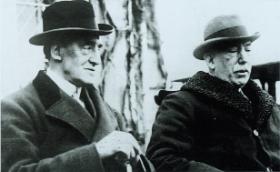‘A Protestant parliament for a Protestant people’?
Published in 20th-century / Contemporary History, Issue 3 (May/Jun 2008), Letters, Letters, Northern Ireland 1920 - present, Volume 16
Sir James Craig—endorsed the July 1920 expulsion of thousands of Catholics from the Harland and Wolff shipyard. (George Morrison)
Sir,
—John Draper and Graham Walker discussed the sectarian ‘boast’ ofNorthern Ireland’s first prime minister, Sir James Craig, that hepresided over a Protestant ‘parliament’, ‘government’, ‘people’ and/or‘state’ (Letters, HI 16.2, March/April 2008). As neither identifiedoriginal sources, there was confusion as to what exactly was said.
In a separate letter, D. R. O’Connor Lysaght noted that Craig endorsedthe July 1920 expulsion of thousands of Catholics from the Harland andWolff shipyard. Protestant socialists who opposed the unionist savagerywere also expelled. It set the tone for the next 50 years. On 14October 1920, Craig unfurled a large Union Jack at the shipyard, andsaid, ‘Do I approve of the action you boys have taken in the past? . .. I say “yes”’ (Macardle, The Irish Republic (1965), p. 387).
Craig referred to Northern Ireland society as Protestant on more thanone occasion, but used slightly different phraseology, hence theconfusion. The utterances had a lengthy gestation and were made inresponse to a controversy provoked by Basil Brooke (later primeminister, 1943–63). Brooke informed an appreciative Orange Orderaudience in 1933 that
‘. . . he had not a Roman Catholic about his own place (cheers). Heappreciated the great difficulty experienced by some . . . in procuringsuitable Protestant labour, but he would point out that the RomanCatholics were . . . out with all their force and might to destroy thepower and constitution of Ulster.’
Brooke denied that Catholics suffered discrimination. In fact, therewere ‘too many appointments for men who would cut their throats if theopportunity arose’. One month later, in response to the resultingdisquiet, Brooke said that ‘he would not withdraw a single word of whathe then said . . . the vast majority of Roman Catholics were disloyal’(Fermanagh Times, 13 July and 17 August 1933). On 19 March 1934, Brookesaid that he ‘had not lost one minute’s sleep’ over his comments, whichwere delivered ‘after thinking out the whole question carefully’. Heconcluded, ‘I want you to realise that, having done your bit, you havegot your prime minister behind you’ (Londonderry Sentinel, 20 March1934). Brooke’s remarks were raised in Stormont the following day.Craig said, ‘there is not one of my colleagues who does not entirelyagree with him, and I would not ask him to withdraw one word he said’.
This was the context for Craig’s 24 April 1934 statement, ‘I am anOrangeman first and a politician afterwards . . . All I boast is thatwe are a Protestant parliament and Protestant state’. On 21 November1934, Craig responded to Cahir Healy MP:
‘The appointments made by the government are made as far as we canpossibly manage it of loyal men and women . . . If a man is a RomanCatholic, if he is fitted for the job, provided he is loyal to thecore, he has as good a chance of appointment as anybody else.’
Craig was asked, ‘How do you test their loyalty?’, and answered:
‘There are ways of finding that out . . . It is undoubtedly our dutyand our privilege, and always will be, to see that those appointed byus possess the most unimpeachable loyalty to the King and Constitution.That is my whole object in carrying on a Protestant Government for aProtestant people.’
Craig lied about ‘loyal’ Catholics. In the 1930s Catholics in publicemployment were ‘outed’ in the unionist press. Minister for HomeAffairs Dawson Bates sacked one such Catholic typist. He declared thatin his most sensitive of departments of state not even the most junioremployee could be a papist. A Catholic gardener at Stormont was sacked,despite having a reference from the Prince of Wales and an impeccableBritish Army record (Brewer and Higgins, Anti-Catholicism in NorthernIreland (1998), pp 100–1). Another Unionist prime minister (1940–3), J.M. Andrews, then minister for labour, stated in 1933: ‘Anotherallegation made against the government and which was untrue was that,of 31 porters at Stormont, 28 were Roman Catholics. I have investigatedthe matter, and I find that there are 30 Protestants, and only oneRoman Catholic, there temporarily’ (Harrison, Ulster and the BritishEmpire (1939), p. 87).
Dawson Bates’s successor faced a novel problem, for a unionist. Duringthe Second World War Bill Lowry was dismayed to discover that many ofthe US servicemen stationed in the North were Roman Catholics. Havingtaken the precaution of billeting them in unionist areas, Lowry wastasked with finding the Catholic contingent a place of worship. Theonly building large enough was a former Orange Hall. Unionists opposedthe plan and the location. Lowry explained that, when the servicemenhad left, ‘we can have the place fumigated’. The pledge placated theopposition but annoyed the US Army. In the interests of the allied wareffort, Lowry apologised (Rafferty, Catholicism in Ulster 1603–1983(1994), p. 243). Let it also be noted that Lowry was related bymarriage to Conor Cruise O’Brien, who wrote in his Memoir (1998, p.84), ‘I dined . . . more than once [at] Bill’s house and I liked him alot, he was not a bigot’. John Draper noted that the historian JonathanBardon was generous in concluding that Craig was also not a bigot.Perhaps Bardon meant it in the C.C. O’B. sense.
NIALL MEEHAN
Griffith College
Dublin
















